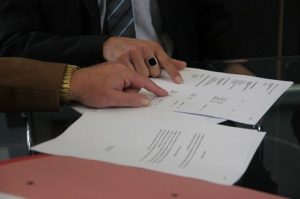TriMark Settlement Highlights Fraud in Set-Aside Programs

In a settlement that DOJ has touted as “the largest-ever False Claims Act recovery based on allegations of small business contracting fraud,” food services equipment supplier TriMark USA agreed to pay $48.5 million to resolve allegations that its subsidiaries used front companies owned by service-disabled veteran-owned small businesses (SDVOSBs) to secure federal set-aside contracts. While TriMark made it appear that it was the SDVOSBs performing the contracts, in fact, the government alleged, TriMark performed substantially all of the work. The government investigation was prompted by a whistleblower complaint under the False Claims Act. The whistleblower will receive an award of $10.9 million.
The TriMark settlement has many of the standard hallmarks of contract set-aside fraud. Federal and state government purchasers set aside or offer preferences on contracts to small and disadvantaged businesses. For example, to help provide a level playing field for small businesses, the federal government limits competition for certain contracts to small businesses, or to small businesses that participate in specific Small Business Administration programs. Federal contracts with set-asides include construction contracts, defense contracts, GSA contracts, and others.
For some, the lure of set-aside contracts is too great. Companies in search of an avenue to secure government contracts seek to game the system by using a qualified bidder on a set-aside contract. While such teaming arrangements can be valid, they must meet specific criteria regarding affiliation and control. Similarly, if a large business is claiming credit for subcontracting to a small or disadvantaged business, the disadvantaged business must be independently responsible for performing a portion of the work with its own employees and equipment. Qualified small businesses cannot serve merely as pass-throughs.
The TriMark settlement agreement recites government allegations that a TriMark subsidiary wrote to an unidentified SDVOSB that they wanted that company to serve “as our TriMark partner focusing on capturing set aside business that we can’t participate in.” The United States contends that TriMark and its affiliates exerted significant influence over each of the small businesses’ decision-making processes during the bid, award, and performance of the federal contracts at issue. The defendants allegedly dictated pricing and contract terms, ghostwrote emails to government officials, and dictated which contracts the small businesses should and should not bid on. The defendants knew that the contracts were secured through false certifications that the bidders met SDVOSB, VOSB, and/or small business criteria.
False statements about small or disadvantaged business status fraudulently induce the government to award contracts to entities that are not eligible to receive those contracts. Even if the work in question is actually performed for the government, the government is damaged by the underlying false representations, and the policy goals of the small business programs are undercut when companies exploit those programs by committing fraud.
Whistleblowers are critical to small business contract fraud, as they can bring information to the government that would otherwise not be available: who was actually doing the work on the contract? Who was reaping the benefits of the contract? Who actually owns and controls the small business? Individuals with information about fraud in government contract set-aside and preference programs can blow the whistle by bringing a claim under the False Claims Act, and may be eligible to receive a financial award.
Read More:
- Contract Set-Aside Fraud
- Government Contract Fraud
- The False Claims Act
- Think you have a whistleblower case?
- The Constantine Cannon Whistleblower Team
- Contact us for a confidential consultation
Tagged in: Catch of the Week, FCA Federal, Government Procurement Fraud, Set-Asides and Preferences, Whistleblower Case,